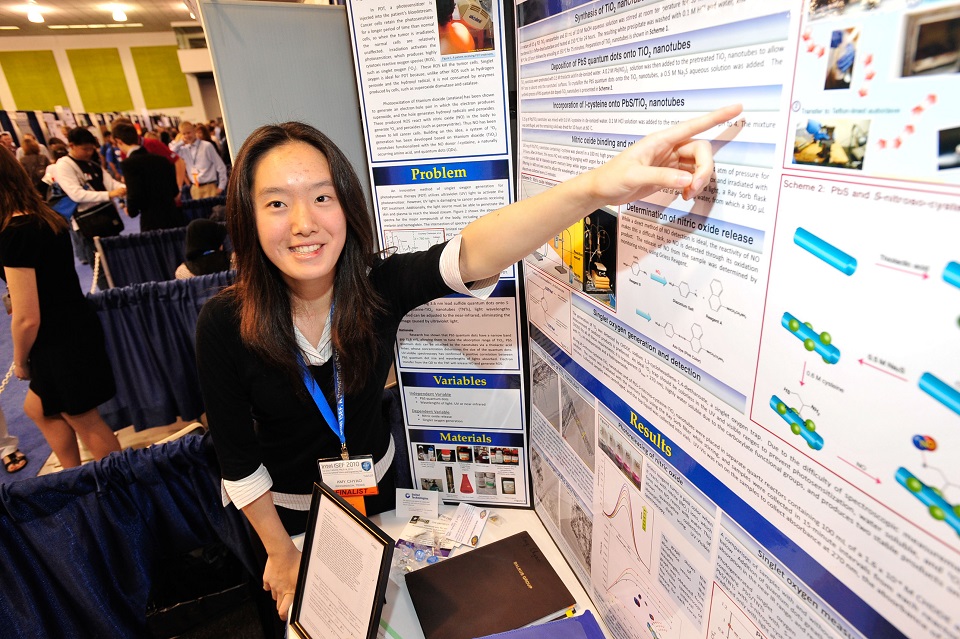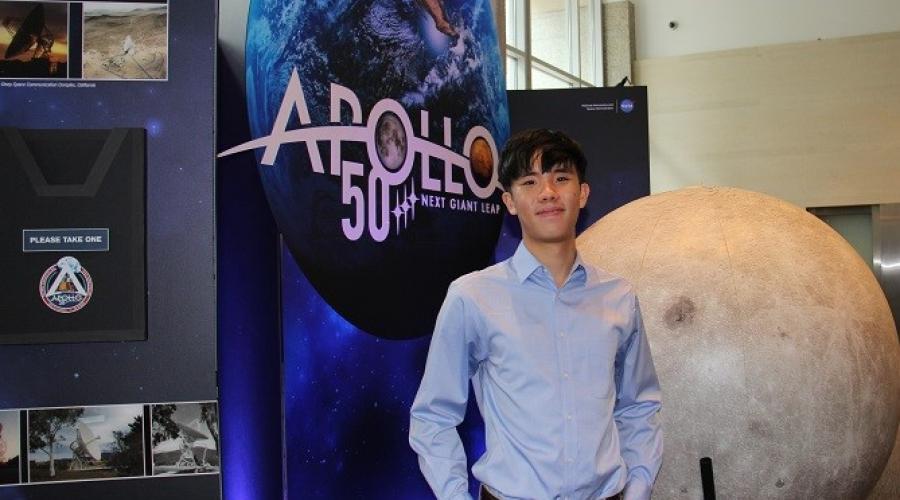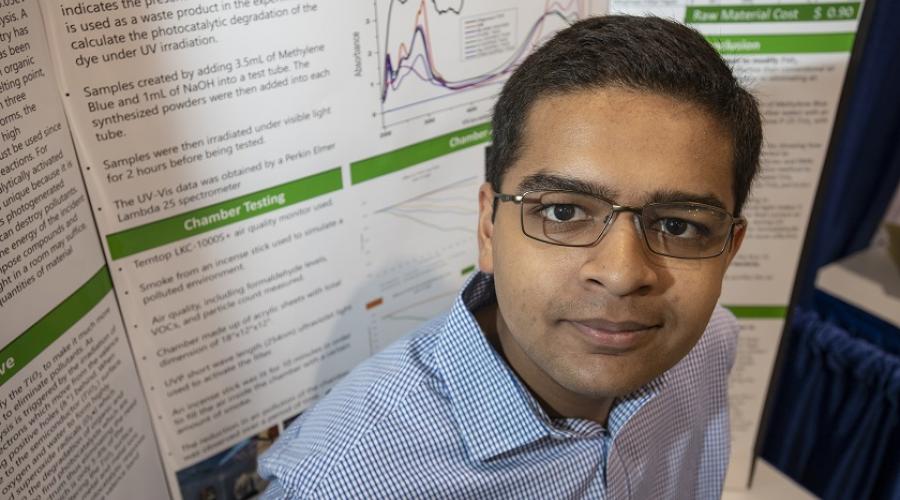Intel ISEF Volunteer: Chris RoDee
Chris RoDee has judged Chemistry projects as a Grand Award Judge for Society for Science & the Public’s Intel ISEF competition.
He loves when a student realizes that the judge they’re discussing their project with “gets it.” Doing the difficult research for a project and presenting the information are very different skills. And Chris encourages young students interested in STEM to take public speaking classes, too. “Learn to speak and write about your work with ease and confidence,” he said. “There is no one more qualified to discuss your work than you!”
The Society asked Chris to reflect on his judging process:
Can you describe the judging process? What does a typical day look like?
The judging day is incredibly rewarding and exhausting. The day starts at about 7 a.m. with breakfast and another chance to review our assigned projects. The preceding day was also spent reviewing projects, and it is an important preparation for judging. After breakfast, the category co-chairs give instructions and guidance on the day, answer questions, and then send the judges out for their scheduled interviews. The day is broken into morning and afternoon sessions with 15-minute interview periods in each session. Typically, a judge will interview about 14-16 finalists during the day.
By mid-afternoon, our formal interview periods are complete and we have the opportunity for more causal interviews to talk to finalists who have a project we were not assigned, but are interested to learn about or to get clarification from one of the scheduled interviews. Then it’s time for dinner and caucusing to decide prizes with our fellow category judges. Typically the day ends at about 8 p.m.
Which scientific category is your area of expertise?
At Intel ISEF I have served in the Chemistry category, but my background would also be appropriate for Material Science, Energy: Chemistry, and Energy: Physics.
I’ve served as a Grand Award judge as well as a Special Awards Organization judge. I’ve also served as a judge at state, regional, and local fairs. For the past seven years I’ve served as a category cochair in chemistry at Intel ISEF. For Intel ISEF 2016, I am on the judging committee for the fair, which is responsible for the overall judging process, and I am on the Local Arrangements Committee, which runs the local aspects of the fair.
What was your favorite experience at Intel ISEF?
That’s a tough one. Every fair has great experiences. Probably the most rewarding experience is when I understand what a student has done and the student gets excited because I understand the project. It’s great to see the smile on his or her face when I “get it” and can talk to them about the project. Often the student’s work is complicated and not until Intel ISEF have they had such a large group of scientists who understand what they have done. It’s very rewarding for all of us to share knowledge of their contributions.
It has been said that judging is the single most important event at Intel ISEF for finalists. Do you agree?
Judging is one of the most important aspects of Intel ISEF for finalists. Most finalists have not previously had the chance to discuss their work with so many scientists of the caliber as the grand award judges. Our judges really are an amazing group that comes from universities, research institutes, Fortune 500 companies, government agencies, the military, and start-up companies. It is really unusual for high school students to have the opportunity to talk to so many professional scientists and engineers in one place.
I also think the Intel ISEF finalists benefit from the opportunity to see and learn about the work of their fellow finalists. This experience validates their interest in science and engineering because, simply put, there are other kids who think science is cool too. Intel ISEF also challenges them when they see what some of the other finalists are researching. This provides a spark to further motivate their research, and it challenges them to improve. The interaction amongst finalists is also important because it lets them know they have peers around the world doing significant science. Intel ISEF gives them the opportunity to form friendships with peers from other countries. Science is a global pursuit and good science happens around the globe. Intel ISEF finalists see this firsthand.
What is the most rewarding aspect of judging for Intel ISEF?
There are many rewarding aspects to judging at Intel ISEF: one, recognizing the finalists with the best projects, two, encouraging all the finalists to further their knowledge of science, three, spending time chatting with such amazing young people, and four, getting to know my fellow judges. All are important.
Did you have the opportunity to judge someone from a different country? Can you describe the experience?
I’ve interviewed many students from outside the U.S. Many Intel ISEF finalists can speak English — I think that is a reflection of the globalization of science and the advantage of having a common language to improve understanding. However, it is always a pleasure to interview non-English speakers, and our Intel ISEF volunteer translators do an outstanding job helping us communicate. The project poster board is almost always in English and that provides us with the opportunity to connect in our conversation. I can point to something on the board and although the student may not know the English words, they know the content of that section of the board. It really helps us to get the conversation moving, and it helps the translator move our discussion along.
How did you first become interested in science?
When I was young, the Apollo missions were going to the moon. It was a magical time to watch those black and white images of astronauts walking on the moon live! What made it even more incredible was to walk outside after seeing the images on our TV, see the moon with my own eyes, and realize there were humans there. I still remember standing outside on a warm summer night in 1969 feeling connected to our distant satellite because there were men there at that moment.
The astronauts brought back rocks from the moon, and I remember reading about what the geochemists were learning about the rocks by analyzing them. As a child, I was amazed that scientists could look at a rock, identify the minerals and the rock’s texture, and then know something about the moon’s history. It was like some sort of Rosetta Stone. Scientists could read the rock “puzzle” and learn things! Anyone who could do this was cool. I wanted to be like them. I wanted to know how the world worked. The 1960s and into the 70s were a time of great optimism about science. There was a belief that science would solve our problems and that scientists and engineers would be the leaders to a new age. Although the view was naive, it was, to some degree, right. I look around the world today and realize how different it was from the life of my parents and grandparents because of science. We as humans are the same as we were when I watched the astronauts walk on the moon, but the things we interact with and how we live are different because of science. Scientists and engineers are leaders in our world because they change how we live and, for the most part, we live better and longer because of them.
Do you have any advice to young people interested in science or math?
First off, young scientists, engineers, and mathematicians should pursue their passion. You should be excited and curious about your area of research. Questions like “why did that happen,” “how can I improve this,” and “what process is at work here” should all come naturally and with excitement. If your mind wanders to your research in quiet moments, you’re probably in the right field.
Second, as a young scientist or engineer you should develop your written and oral communication skills. Public communication is often a challenge for STEM-oriented students, but it is vital. You may have made or will make a really important discovery or designed a great new device, but if you can’t communicate so people understand what you have done, your work may be lost. Don’t count on someone else to speak for you. Learn to speak and write about your work with ease and confidence. There is no one more qualified to discuss your work than you! In high school, take an elective in persuasive writing or public speaking instead of one more science elective. Or, join an organization or get a job where your writing and speaking skills can develop. You’ll reap the benefits the rest of your professional life.


